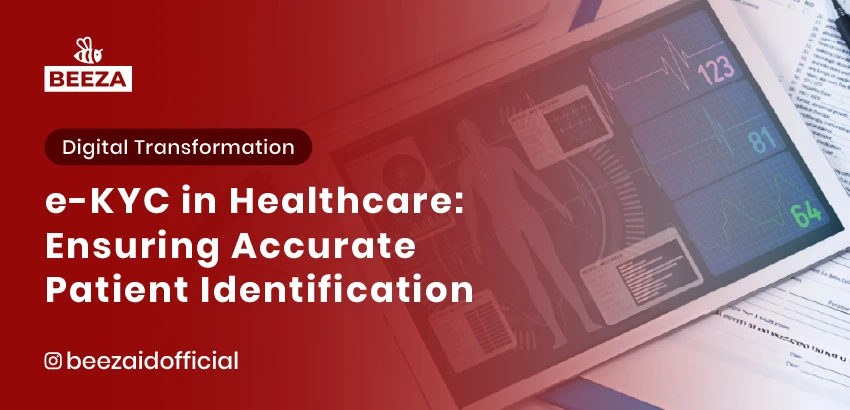
eKYC in Healthcare
The digital transformation of the healthcare industry is advancing rapidly, with patient identity verification being a crucial aspect. Inaccurate patient identification can lead to severe consequences, such as misdiagnosis, medical errors, and insurance fraud.
This is where Electronic Know Your Customer (eKYC) technology comes into play. By leveraging biometrics and artificial intelligence (AI), eKYC enables fast, secure, and accurate identity verification for patients. But how does eKYC work in healthcare, and what are its benefits and challenges? This article explores the impact of eKYC in modern healthcare systems.
What is eKYC in Healthcare?
eKYC (Electronic Know Your Customer) is a digital process that verifies identities using technologies like biometrics, facial recognition, and electronic document authentication. In healthcare, eKYC is used for:
- Digital patient registration without physical paperwork.
- Ensuring accurate patient identification before treatments to prevent medical errors.
- Linking patient data with electronic health records (EHRs) for seamless access.
- Minimizing healthcare insurance fraud by verifying legitimate beneficiaries.
This technology enhances hospital efficiency, reduces waiting times, and improves the overall patient experience.
Key Benefits of eKYC in the Healthcare Sector
The digital transformation in the healthcare industry is advancing rapidly, and one of the innovations making a significant impact is eKYC (Electronic Know Your Customer). By leveraging biometric technology and digital verification, eKYC brings numerous benefits to patients, medical professionals, and healthcare institutions. Here are the key benefits of eKYC in the healthcare sector:
1. Improved Accuracy in Patient Identification
Errors in patient identification can be fatal, especially if a patient receives an incorrect diagnosis or treatment. With eKYC, patient identification is carried out digitally using biometric technology such as facial recognition or fingerprint scanning. This ensures that patient data remains accurate and is not misidentified.
Example: A hospital implementing eKYC can reduce the risk of medical errors due to misidentified patients. For instance, a patient with a specific allergy will not be mistakenly given the wrong medication because the system accurately identifies their medical records through biometric verification.
2. Faster and More Convenient Patient Experience
One of the main challenges in healthcare services is long waiting times during registration. With eKYC, patients no longer need to bring physical documents or manually fill out lengthy forms. The verification process can be completed within seconds, expediting check-ins and making visits to healthcare facilities more efficient and convenient.
Example: In clinics or hospitals that have implemented eKYC, patients can simply use biometric identification at self-service registration kiosks. This not only speeds up the registration process but also reduces long queues at the reception desk.
3. Enhanced Data Security and Privacy
In conventional systems, patient data is often stored as physical documents, making them vulnerable to theft, loss, or misuse. eKYC employs encryption systems that ensure patient data is securely stored and accessible only to authorized personnel.
Example: A hospital using eKYC can prevent patient data breaches because every access to medical information requires strong authentication, such as facial or fingerprint verification.
4. Prevention of Healthcare Insurance Fraud
Fraudulent claims in health insurance pose a significant financial burden on insurance companies and hospitals. With eKYC, claims can only be submitted by the rightful identity owner, reducing the risk of fraudulent claims.
Example: An insurance company integrating eKYC can ensure that every claim is submitted by a verified individual, reducing double claims or identity misuse.
5. Increased Efficiency for Healthcare Providers
With eKYC, administrative processes such as patient registration, identity verification, and medical data management become more automated. This allows healthcare staff to focus more on patient care rather than time-consuming administrative tasks.Example: In hospitals that implement eKYC, nurses and administrative staff no longer need to manually record or verify patient documents physically. They can directly access digitally verified data, saving time and increasing productivity.
Challenges and Solutions in eKYC Implementation
1. Regulatory Compliance
Healthcare institutions must comply with data protection laws such as Indonesia’s Personal Data Protection Law (UU PDP). Partnering with experienced eKYC providers ensures compliance.
2. Data Security Concerns
Patients may worry about data misuse. Implementing encrypted biometric storage and strict access controls can address these concerns.
3. Accessibility in Remote Areas
Some regions lack the infrastructure for digital healthcare solutions. Cloud-based eKYC allows access from basic mobile devices, reducing the need for expensive on-premise systems.
Beeza provides a secure, AI-driven eKYC solution tailored for healthcare providers, ensuring regulatory compliance and seamless integration.
Future Trends in eKYC for Healthcare
1. Blockchain Integration for Secure Medical Records
Blockchain technology can create tamper-proof patient records, ensuring high levels of security and trust.
2. AI-Powered Patient Data Analysis
Artificial intelligence will enhance predictive healthcare, helping doctors detect diseases earlier through automated patient data analysis.
3. Global Digital Health Identity
In the future, patients might use a single digital health ID to access medical services worldwide, reducing paperwork and administrative inefficiencies.
Conclusion
eKYC is revolutionizing healthcare by improving patient identification, reducing fraud, and enhancing operational efficiency. With biometric and AI-driven solutions, hospitals and clinics can ensure secure, seamless patient verification.Beeza offers cutting-edge eKYC solutions that integrate seamlessly with healthcare systems. Contact us today to learn how eKYC can enhance your healthcare services!